2020年中考英语专题复习:冠词
- 格式:doc
- 大小:28.00 KB
- 文档页数:15

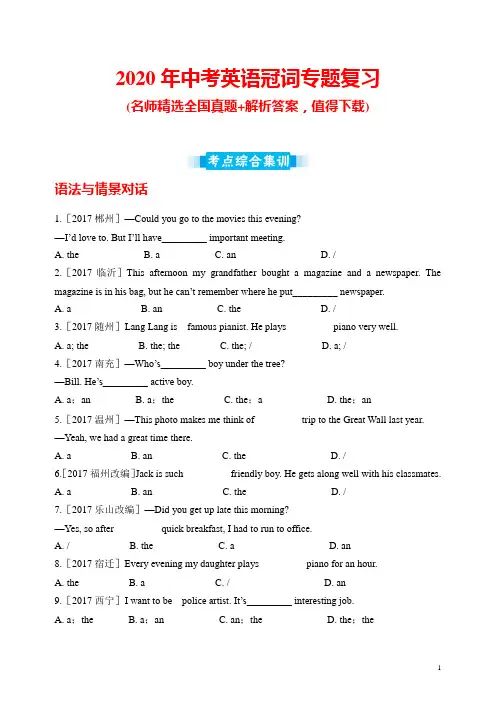
2020年中考英语冠词专题复习(名师精选全国真题+解析答案,值得下载)语法与情景对话1.[2017郴州]—Could you go to the movies this evening?—I’d love to. But I’ll have_________ important meeting.A. theB. aC. anD. /2.[2017临沂]This afternoon my grandfather bought a magazine and a newspaper. The magazine is in his bag, but he can’t remember where he put_________ newspaper.A. aB. anC. theD. /3.[2017随州]Lang Lang is famous pianist. He plays_________ piano very well.A. a; theB. the; theC. the; /D. a; /4.[2017南充]—Who’s_________ boy under the tree?—Bill. He’s_________ active boy.A. a;anB. a;theC. the;aD. the;an5.[2017温州]—This photo makes me think of_________ trip to the Great Wall last year. —Yeah, we had a great time there.A. aB. anC. theD. /6.[2017福州改编]Jack is such_________ friendly boy. He gets along well with his classmates.A. aB. anC. theD. /7.[2017乐山改编]—Did you get up late this morning?—Yes, so after_________ quick breakfast, I had to run to office.A. /B. theC. aD. an8.[2017宿迁]Every evening my daughter plays_________ piano for an hour.A. theB. aC. /D. an9.[2017西宁]I want to be police artist. It’s_________ interesting job.A. a;theB. a;anC. an;theD. the;the10.[2017黄石]On_________ Children’s D ay, Jack received a prize for being _________ honest boy.A. the;anB. /;anC. /;aD. the;a11.[2017东营]—In London, dogs and their owners enjoy_________ hour-long free bus tour. —Wow! I hope we can also have such a service in Dongying.A. aB. anC. /D. the12.Thank you for giving me such_________ useful suggestion.A. /B. aC. anD. the13.Mike is my good friend. He is _________ American boy.A. aB. anC. theD. /14.—What cold weather!—Yes. But it’s_________ unusual experience for us who live in a hot place.A. aB. anC. theD. /15.This is_________ book I have told y ou about. It’s written by a university teacher.A. theB. anC. aD. /16.Every time when you are faced with difficulties, don’t be afraid. Just have_________ try.A. aB. anC. theD. /17.Misha is always_________ first person to enter the classroom.A. aB. anC. theD. /18.Tom goes to church once_________ week because he is a christian(基督教徒).A. aB. anC. theD. /19. —Do you know how to spell_________ word “napkin” in English?—Yes. It begins with_________“n”.A. the; aB. the; anC. a; theD. the; the20. —Have you seen cartoon film Zootopia?—Of course. It’s_________ most interesting film I’ve ever seen.A. a; theB. the; aC. a; aD. the; the详细答案语法与情景对话1.C【解析】考查冠词的用法。

人教版中考英语专题复习《冠词专题》教案一. 教材分析《人教版中考英语》教材在冠词专题部分,主要围绕不定冠词a/an和定冠词the的用法进行讲解。
这部分内容是中考英语考试的重点,也是学生容易出错的点。
教材通过典型例句和练习,帮助学生理解和掌握冠词的用法。
二. 学情分析学生在学习冠词专题时,通常已经掌握了部分冠词的用法,但对其具体用法和适用场合理解不深,容易混淆。
此外,学生在使用冠词时,常常出现漏用、错用的情况。
因此,教师需要通过详细的讲解和大量的练习,帮助学生巩固冠词知识。
三. 教学目标1.知识目标:使学生掌握不定冠词a/an和定冠词the的用法,能正确运用冠词修饰名词。
2.能力目标:培养学生运用冠词进行交际的能力。
3.情感目标:激发学生学习英语的兴趣,培养其积极向上的学习态度。
四. 教学重难点1.重点:不定冠词a/an和定冠词the的用法。
2.难点:冠词的适用场合和具体用法。
五. 教学方法采用任务型教学法,通过大量的练习和实际交际场景,让学生在实践中学习和掌握冠词的用法。
同时,运用提问法、讨论法等,激发学生的思维,提高其学习兴趣。
六. 教学准备1.准备相关PPT课件,展示冠词的用法和典型例句。
2.准备练习题,用于巩固所学知识。
3.准备一些日常用品,如苹果、书籍等,用于实际操作演示。
七. 教学过程1.导入(5分钟)利用提问法,引导学生回顾已学的冠词知识,如不定冠词a/an和定冠词the的用法。
同时,通过展示一些日常用品,如苹果、书籍等,激发学生的学习兴趣。
2.呈现(10分钟)利用PPT课件,展示不定冠词a/an和定冠词the的用法,以及它们的具体适用场合。
通过典型例句,让学生理解并掌握冠词的用法。
3.操练(10分钟)将学生分成小组,每组选一个日常用品,如苹果、书籍等。
要求学生用不定冠词a/an和定冠词the造句,描述这个日常用品。
完成后,各组之间进行交流和讨论,互相纠正错误。
4.巩固(10分钟)出示练习题,要求学生独立完成。
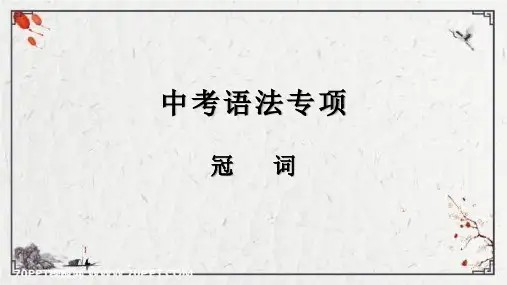
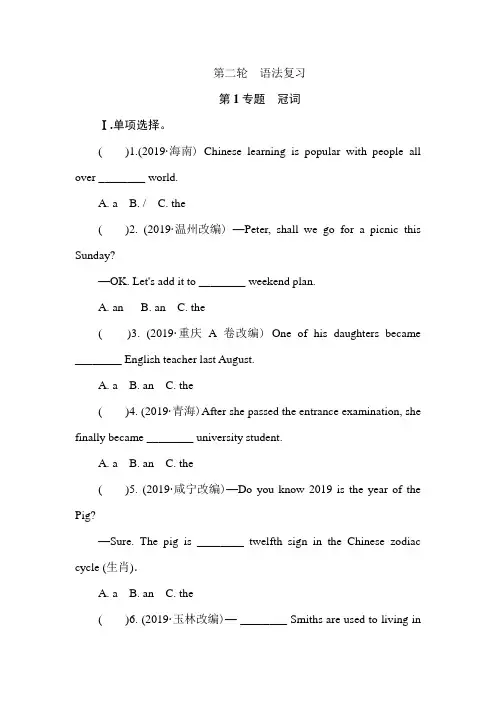
第二轮语法复习第1专题冠词Ⅰ.单项选择。
( )1.(2019·海南)Chinese learning is popular with people all over ________ world.A. aB. /C. the( )2. (2019·温州改编)—Peter, shall we go for a picnic this Sunday?—OK. Let's add it to ________ weekend plan.A. anB. anC. the( )3. (2019·重庆A卷改编)One of his daughters became ________ English teacher last August.A. aB. anC. the( )4. (2019·青海)After she passed the entrance examination, she finally became ________ university student.A. aB. anC. the( )5. (2019·咸宁改编)—Do you know 2019 is the year of the Pig?—Sure. The pig is ________ twelfth sign in the Chinese zodiac cycle (生肖).A. aB. anC. the( )6. (2019·玉林改编)— ________ Smiths are used to living inShanghai now.—We hope more and more foreign friends live ________ better life in China.A. /; aB. The; anC. The; a( )7. (2019·大庆改编)Our English teacher told us ________ interesting story and ________ story was about Thomas Edison.A. an; aB. the; theC. an; the( )8. (2019·齐齐哈尔改编)—You've droppe d ________ “f” in the word “giraffe”.—Oh, ________ letter “f” should be doubled.A. an; aB. a; theC. an; the( )9. (2019·毕节改编)Our National Day is on ________ first day in ________ October.A. a; theB. the; aC. the; /( )10. (2019·泰州改编)As ________ volunteer at the Beijing Expo 2019(园艺博览会), Lu Ming understands ________ idea of green life better than before.A. a; anB. a; theC. the; an( )11. (2018·南充改编)Peter, ________ honest boy, bought ________ useful dictionary in the store yesterday.A. a; aB. an; anC. an; a( )12. (2018·滨州改编)—Have you seen the movie WolfWarriorsⅡ?—Yes. This is ________ educational film and it has become one of ________ most popular films in the world.A. a; /B. a; theC. an; the( )13. (2018·潍坊改编)To prepare for ________ trip to LA, Betty is making ________ list of things to take along.A. the; theB. /; aC. the; a( )14. (2018·益阳)—Have you seen ________ film Journey to the West?—Yes, it's ________ interesting film.A. a; anB. a; theC. the; an( )15. (2019·扬州改编)—Look at ________ boy over there. He looks excited.—Yeah, he has won ________ first prize in the school English Reading & Writing Competition.A. a; theB. the; aC. the; theⅡ.用a, an, the或/填空。
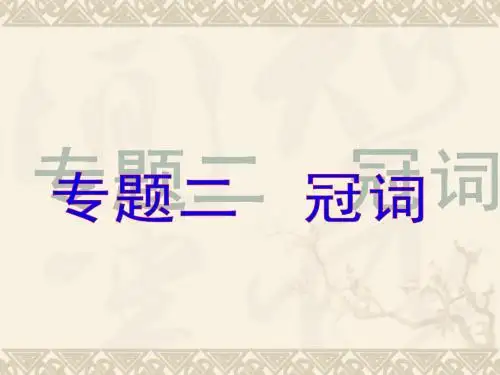
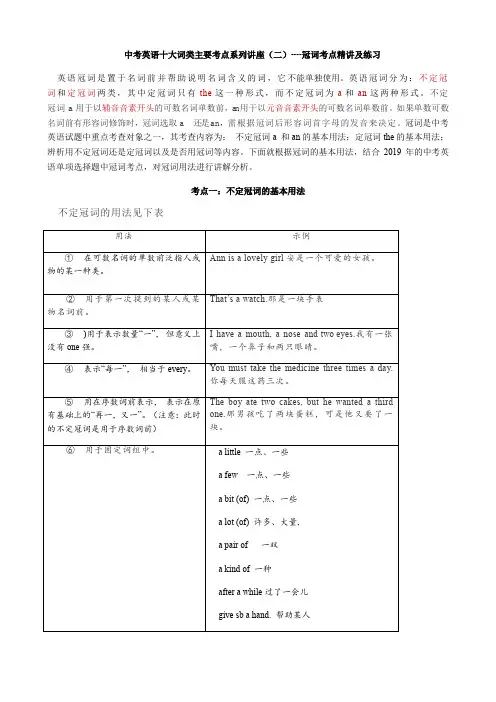
中考英语十大词类主要考点系列讲座(二)----冠词考点精讲及练习英语冠词是置于名词前并帮助说明名词含义的词,它不能单独使用。
英语冠词分为:不定冠词和定冠词两类,其中定冠词只有the这一种形式,而不定冠词为a和an这两种形式。
不定冠词a用于以辅音音素开头的可数名词单数前,a n用于以元音音素开头的可数名词单数前。
如果单数可数名词前有形容词修饰时,冠词选取a 还是an,需根据冠词后形容词首字母的发音来决定。
冠词是中考英语试题中重点考查对象之一,其考查内容为:不定冠词a 和an的基本用法;定冠词the的基本用法;辨析用不定冠词还是定冠词以及是否用冠词等内容。
下面就根据冠词的基本用法,结合2019年的中考英语单项选择题中冠词考点,对冠词用法进行讲解分析。
考点一:不定冠词的基本用法不定冠词的用法见下表(1)下列词语,虽然是以元音字母开头,但其第一个音素实为辅音音素,故只能用不定冠词a。
概括为:(a European,a university student;a useful, a usual ear--microphone;a one--hou r story )(2)下列词语,虽然是以辅音字母开头,但其第一个音素实为元音音素,故只能用不定冠词an。
概括为:(an honest, an hour , an honor)【典型考例1】(2019重庆A卷)One of his daughters became ______ English teacher last August.A.aB.anC.theD./【析】正确答案:B。
句意:他的一名女儿去年成为了一名英语教师。
“一名英语教师”表示某一类人,应使用不定冠词,因为English的第一个音素为元音,所以应使用不定冠词an。
【典型考例2】(2019四川内江)----What________ useful book it is!----Yeah, it tells you how to play the guitar.A.an B.a C.the D./【析】正确答案:B.句意:多么有用的一本书啊!是的,它告诉你怎样弹奏吉他。
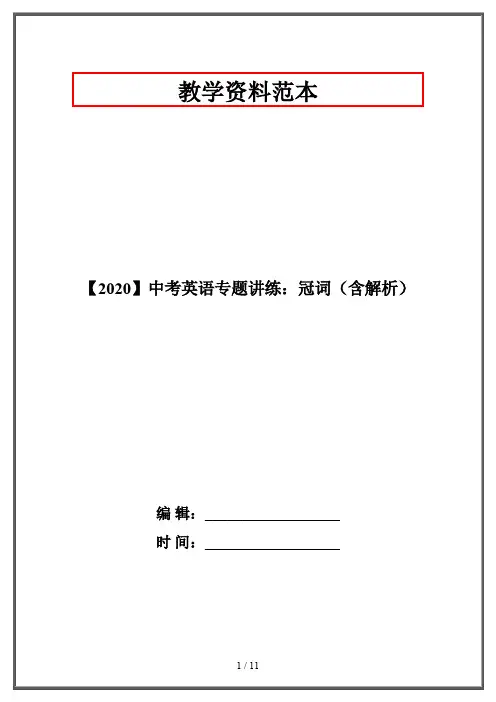
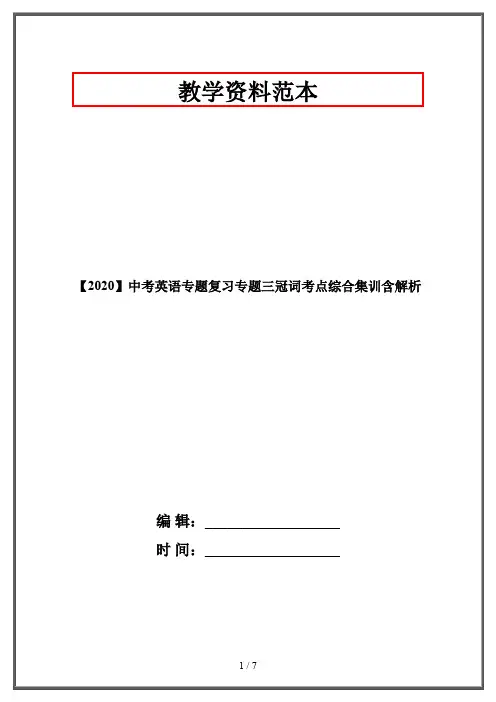
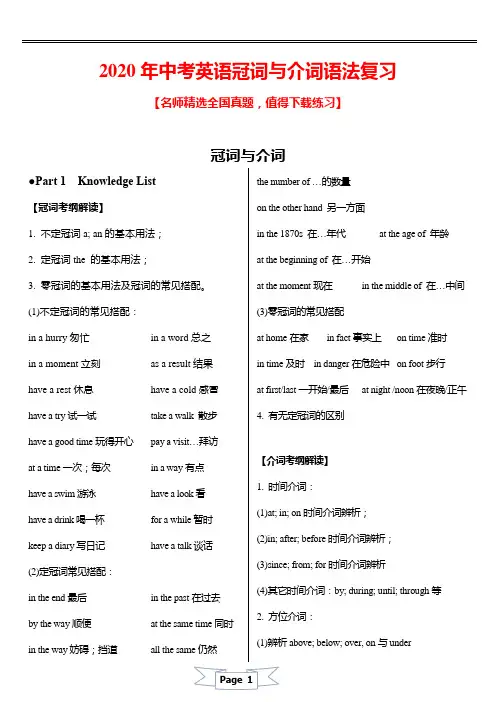
2020年中考英语冠词与介词语法复习【名师精选全国真题,值得下载练习】冠词与介词●Part 1 Knowledge List【冠词考纲解读】1. 不定冠词a; an的基本用法;2. 定冠词the 的基本用法;3. 零冠词的基本用法及冠词的常见搭配。
(1)不定冠词的常见搭配:in a hurry匆忙in a word总之in a moment立刻as a result结果have a rest休息have a cold感冒have a try试一试take a walk 散步have a good time玩得开心pay a visit…拜访at a time一次;每次in a way有点have a swim游泳have a look看have a drink喝一杯for a while暂时keep a diary写日记have a talk谈话(2)定冠词常见搭配:in the end最后in the past在过去by the way顺便at the same time同时in the way妨碍;挡道all the same仍然the number of …的数量on the other hand 另一方面in the 1870s 在…年代at the age of 年龄at the beginning of 在…开始at the moment现在in the middle of 在…中间(3)零冠词的常见搭配at home在家in fact事实上on time准时in time及时in danger在危险中on foot步行at first/last一开始/最后at night /noon在夜晚/正午4. 有无定冠词的区别【介词考纲解读】1. 时间介词:(1)at; in; on时间介词辨析;(2)in; after; before时间介词辨析;(3)since; from; for时间介词辨析(4)其它时间介词:by; during; until; through等2. 方位介词:(1)辨析above; below; over, on与under(2)辨析at; in; on; to(3)辨析across; cross; through; over与(4)辨析in front of与in the front of(5)其它常见方位介词:3. 表交通工具的方式介词:by; in; on4. in; with; by表示“用”时的区别;5. but; besides; except的区别;6. of sb与for sb的区别;7. 固定搭配:介词to+ doing.8. 其它常见介词:●Part 2 Typical Cases1. Teachers always tell us to try toA. a; anB. an; aC. an; an2. In order to get a better job, he____ second foreign language.A. theB. an;C. a3. –--____ the beginning of June, 2008.A. AtB. InC. On4. Jack and Brown had finished the end of last week.A. atB. inC. ona jacket _____ her head.A. overB. underC. acrossthe development of our country, people isB. ByC. InD. WithB. byC. forD. withB. acrossC. throughD. past terrible accident happened ____ him ____aB. on; onC. to; onD. at; atDragon Boat Festival this year will comeB. forC. duringD. inB. beforeC. inD. for can have ____ blue sky if we create ____B. a; theC. the; aD. the; the turned ____ the radio a little because hisB. onC. upD. downB. toC. ofD. onB. withC. inD. onPracticeI. 单项选择。
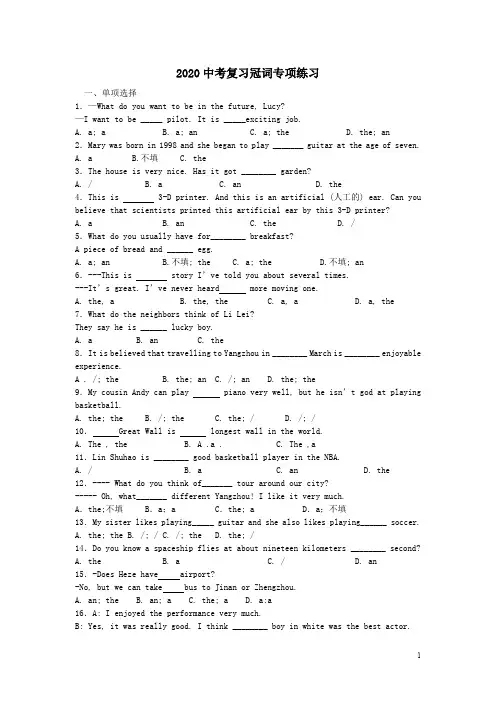
2020中考复习冠词专项练习一、单项选择1.—What do you want to be in the future, Lucy?—I want to be _____ pilot. It is _____exciting job.A. a; aB. a; anC. a; theD. the; an2.Mary was born in 1998 and she began to play _______ guitar at the age of seven.A. aB.不填C. the3.The house is very nice. Has it got ________ garden?A. /B. aC. anD. the4.This is 3-D printer. And this is an artificial (人工的) ear. Can youbelieve that scientists printed this artificial ear by this 3-D printer?A. aB. anC. theD. /5.What do you usually have for________ breakfast?A piece of bread and ______ egg.A. a; anB.不填; theC. a; theD.不填; an6.---This is story I’ve told you about several times.---It’s great. I’ve never heard more moving one.A. the, aB. the, theC. a, aD. a, the7.What do the neighbors think of Li Lei?They say he is ______ lucky boy.A. aB. anC. the8.It is believed that travelling to Yangzhou in ________ March is ________ enjoyable experience.A . /; the B. the; an C. /; an D. the; the9.My cousin Andy can play piano very well, but he isn’t god at playing basketball.A. the; theB. /; theC. the; /D. /; /10. Great Wall is longest wall in the world.A. The , theB. A .a .C. The ,a11.Lin Shuhao is ________ good basketball player in the NBA.A. /B. aC. anD. the12.---- What do you think of_______ tour around our city?----- Oh, what_______ different Yangzhou! I like it very much.A.the;不填 B.a;a C.the; a D.a;不填13.My sister likes playing_____ guitar and she also likes playing______ soccer.A. the; theB. /; /C. /; theD. the; /14.Do you know a spaceship flies at about nineteen kilometers ________ second?A. theB. aC. /D. an15.-Does Heze have airport?-No, but we can take bus to Jinan or Zhengzhou.A. an; theB. an; aC. the; aD. a:a16.A: I enjoyed the performance very much.B: Yes, it was really good. I think ________ boy in white was the best actor.A: a B: an C: the D: /17.There is egg in the bowl.A. aB. (不填)C. anD. the18.— What's in the box?—There is apple and some oranges in it.A. aB. anC. the19. man in a black hat is my PE teacher. He often plays football with us.A. A; theB. The; aC. The; /D. A; / 20.Hurry up,or we’ll be late.Take your time—it’s just ______short distance from here to ________cinema.A./;the B.the;a C.a;the D./;a21.Perhaps the famous football star won’t play__________ football any longer.A. a B. an C. the D./22.---Excuse me, is there ________ book by Mo Yan?---Yes. It’s on _________ bookshelf over there.A. a; /B. a; theC. /; theD. the; a23.Maria would like orange, not orange juice.A. a; theB. /; anC. an; /D. an; an24.-This is a useful dictionary, I think.-So it is, and it’s ______ unusual one.A. theB. anC. aD. 不填25.I like _______ color of your coat. I’ll buy _______ blouse like this color.A. the; theB. a; aC. the; aD. a; the26.They often take walk after dinner.A. aB. ∕C. theD. an27.Who is ___________ man under the tree?A. aB. anC. theD. /28.My friend Amy often takes walk with her dog in the park after dinner.A. 不填B. aC. anD. the29.-----What’s _____matter with you?------I have_____ fluA. the, / B . /, the C. the, the30.Do you know ______ girl in green? She is our monitor.A. aB. anC. theD. 不填31.We play ________ basketball after class.A. aB. anC. theD. /32.-Are you going to Beijing by ______ train?-No. I’m taking ______ car.A. /;aB. A; theC. /; /D. the; a33.It is a good habit to go to ______ bed early and get up early.A. aB. anC. theD. 不填34.I think it’s really _________ hard work for me to finish the job in twenty minutes.A. aB. anC. theD. 不填35.—How do you like ________color of my dress?—Wonderful! I like it very much.A. aB. anC. theD. /36.—What’s matter?— A car is in way.A. a; aB. /; theC. the; aD. the; the37.—Lily, there is _________ schoolbag near the window. Is it yours?—Yes, it is. Thank you!A. aB. anC. theD. 不填38.She has got two cats now. ______ black and white one is called Rosie and ______ brown one Joseph.A. The; aB. A; theC. The; theD. A; a39.Guan Tianlang is _____________ 14-year-old boy, but he is famous all over the world.A. aB. anC. theD. /40.—Do you know ______ woman in red?—Yes, she’s a professor of_________ university.A. the;aB. a;anC. the;anD. / ; the41.Look at ______ girl with sunglasses. She is my cousin.A. aB. anC. theD. /42.Lily is _____ girl .A . a 8-years-old B. an 8-years-oldC. an 8-year-oldD. a 8-year-old43.—Which coat would you like?—I’d like _________ orange one with white flowers on it.A. aB. anC. theD. /44.-- Are you _______ American or English? -- English. We both work in Shanghai.A. aB. /C. theD. an45.Ge You is ______ interesting actor. He has lots of fans.A. aB. 不填C. an46.---Do you think that Obama is honest and capable man?---Yes. And that is why he was chosen president of America.A. a; aB. the; theC. an;/D.a;/ 47.He is_____ American. I’m_____ English.A. a,aB. an,aC. the,theD./,/48.---I would like to sit in __________ front of the bus.---Me, too. And we can have ________ better view.A. /, theB. /, aC. the, aD. the, the参考答案1.B【解析】冠词是一种虚词,一般用于名词前面表示特指或者泛指某一个。
第 1 页 共 1 页 2020年中考英语专题复习:冠词 【冠词命题】 考查重点为: 1、不定冠词、定冠词、零冠词的使用情况; 2、 不定冠词a和an的使用情况。v 解题关键:熟记各种冠词的适用范围! 【考点诠释】 一、不定冠词a和an 1、不定冠词一般只用于“单数可数名词”之前1)“a”用于以辅音音素开头的单词前;2)“an”用于以元音音素开头的单词前。 [a]、[e]、[i]、[o]、[u]常见的以元音字母开头的单词用a,an的情况:A aan ancient story/an apple/an artist/an aunt/an Asian country/an American girlE ean exciting job/a European country/an egg/an8-year-old boy/an11-year-old boy/an E-mail addressI ian idea/an interesting storyO oan orange/an old man/an outgoing girl/an Olympic starU ua “u”/a useful book/a university student/a UFO/a usual farmer/an umbrella/an ugly man/an uncle/an unusual story/an unhappy day特别记不规则:an honest boy/an hour以元音音素开头的字母:an“a,e,f,h,i,l,m,n,o,r,s,x” 第 1 页 共 1 页
【考例】 There is “s” in the word “summer”、 A、 a B、 an C、the D、 / 【点拨】 第一步分析语境:单词“summer”中有 “s”。可知,这里要表达单词“summer”中有一个“s”,故排除表特指的定冠词the和零冠词;第二步:空格后的“s”是以元音音素开头的字母,故选不定冠词an,选B。3) 不定冠词的基本用法(1) 用于第一次提到的人或事物的名称前。eg: I saw a boy over there、 He was sleeping、 我在那边看到一个男孩。他正在睡觉。(2) 用来指一类人或事物中的任何一个,相当于any。eg: I want to buy an English book、 我想买本英语书。(3) 表示数量,相当于one或each。eg: I have a mouth and a nose、 我有一个嘴巴和一个鼻子。(4) 指某人或某物,但不具体指明哪个人或物。eg: A man is waiting for you at the gate、 有个人在门口等你。(5) 表示类别,泛指一类人或物。eg: A horse is much bigger than a rabbit、 马比兔子大得多。(6) 表示“每一”的意思,相当于every。eg: once a week 一周一次200 kilometers an hour 每小时200公里(7) 用在 第 1 页 共 1 页
such,quite,rather,half,what等词之后。eg: such a busy day 如此忙碌的一天 half an hour 半小时4) 不定冠词的固定搭配a few 一些;少数 a bit/little 一点儿 a lot of 许多;大量a piece of 一片;一块;一张;一条 have a cold 患感冒have a meal 吃顿饭 have a rest 休息下 have a walk 散步have a try 试一试 after a while 一段时间以后take a seat 坐下 keep a diary 写日记 ride a bike 骑自行车have a good time 玩的开心 in a word 总而言之do sb、 a favor/give sb、 a hand 帮助某人 二、定冠词the 1、定冠词的基本用法(1)上文已经提到的人或事物前,表特指。eg: I saw a film last night、 The film was very interesting、 昨晚我看了一部电影。那部电影非常有趣。(2) 谈话双方都熟悉的人或事物前。eg: The bag on the desk isn’t mine、 桌子上的那个包不是我的。(3) 世界上独一无二的事物前。eg: The sun is far away from the earth、 太阳离地球很远。(4) 序数词、形容词的最高级前。eg: This mooncake is the nicest of all、 这块月饼是所有月饼中最好吃的。(5) 单数可数名词前,表示一类人或物。eg: The dog is the friend of human、 狗狗是人类的好朋友。(6) 姓氏复数前,表示“一家人”或“夫妇”。eg: The Greens are watching TV in the living room、 格林夫妇正在客厅看电视。 第 1 页 共 1 页
(7) 形容词前,表示一类人或事物。eg: The new is to take the place of the old、 新事物将会替代旧事物。(8) 西洋乐器名称前。eg: Can you play the guitar? 你会弹吉他吗?(9) 用于江河海洋等专有名词前。eg: He lives by the Changjiang River、 他住在长江边上。(10) 用于“the+比较级,the+比较级”的句式中。eg: The longer you stay, the better it will be、 你待的时间越长就越好。 2、定冠词的固定搭配in the sky 在天空中 in the end 最终 in the open air 在户外in the world 在世界上 in the morning/afternoon/evening 在上午/下午/晚上in the middle of 在、、、的中间 at the same time 同时at the beginning of 在、、、的开始 at the end of 在、、、的末尾all the time 一直 all(the) year around 一年到头 三、零冠词(不加冠词) 1、零冠词的基本用法(1)在一日三餐、球类运动、语言、学科、棋类、游戏名词前。如:have supper 吃晚饭 play basketball 打篮球 learn English 学英语 play chess 下国际象棋(2) 在与by连用的交通工具名称前。 如:by train 坐火车 by bus 坐公交车(3) 人名、地名、街道名、城市名、洲、省、机场以及大多数大学、公园、节日等专有名词前。如:Beijing Street 北京大街 Baiyun Airport 白云机场Teachers’ day 教师节(4) 季节、月份、星期前。如: 第 1 页 共 1 页
summer 夏天 January 一月 Sunday 星期天(5) 名词前有物主代词、指示代词、不定代词、疑问代词、或名词所有格修饰时。如:this book 这本书 my son 我的儿子Jack’s bike 杰克的自行车 2、零冠词的常见搭配at home 在家 at first/last 首先/最后 at present 目前at night 在夜里 in case 万一 in fact 事实上in time 及时 in danger 在危险中 on earth 究竟on foot 步行 day and night 日日夜夜hand in hand 手拉手真题再现 ( ) 1、(xx•绵阳)Jason likes ______ shape of the cake、It is ______ heart、 A、the; a B、a; the C、the; the D、a; a( ) 2、(xx•黑龙江)-Who is ______ girl behind the tree?-Which one?The one with ______ umbrella? A、a; the B、the; an C、the; a( ) 3、(xx•雅安)Beijing is capital of China、 A、a B、an 第 1 页 共 1 页
C、the D、/( ) 4、(xx•淮安)Jack often plays _____ piano and he wants to be a pianist when he grows up、 A、a B、an C、/ D、the( ) 5、(xx•齐齐哈尔)-Whats matter with you?-I have fever、 A、an,the B、the,/ C、the,a( ) 6、(xx•黄石)-What did you do last night,Bob?Dong Guijun is _____ first man of Lianyungang to reach the top of Mount Qomolangma、--Do you know____girl with long curly hair?-Yes、She is Mary、She plays____piano very well、 A、a;/ B、the;/ C、the;the D、a;the( )